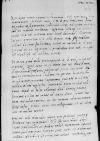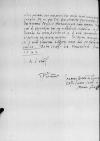List #2603
Jan TARNOWSKI do Ioannes DANTISCUSCracow (Kraków), 1542-11-24
| odebrano Heilsberg (Lidzbark Warmiński), 1542-12-16 Rękopiśmienne podstawy źródłowe:
| ||||
Tekst + aparat krytyczny + komentarz Zwykły tekst Tekst + komentarz Tekst + aparat krytyczny
Reverendissimo Domino
Reverendissime Domine, amice carissime et honorande.
Salutem plurimam amicissimamque mei commendationem.
Reddidit mihi a Reverendissima Dominatione Vestra cf.
Res novas quod mihi perscripserit Reverendissima Dominatio Vestra, habeo item ei gratiam. Quod vero in eo statu sint res Christianae, id non aliunde proficisci palam est quam divinitus. Nam quod eo processerimus libidinis, ut parum honesta bonis rebus anteponamus, sequamur privatam utilitatem salute publica neglecta, praetextu verae in Deum religionis impie et falso colamus Deum, denique omnia faciamus, quibus non potest non irasci Deus, idcirco hac poena nos voluit punitos, ut hoc nomine admoneremur officii nostri. Utinam vero nos colligamus et Dominus Deus haec in melius vertat.
Quod autem mihi commendat nuper vita perfuncti Georgii servitoris mei necessarium, etsi ille moriturus, quod habuit supellectilis suae, quibus voluit, testamento legavit, tamen, quod ego sciam parentes suos satis esse pauperes, constitui distributis iis rebus, quo voluit, perfectisque operibus pietatis eos impartiri hac parte rerum suarum, quae [est] reliqua. Ac ut qui sint sui parentes, percontetur dominus
Postremo commendo [me] Reverendissimae Dominationi Vestrae plurimum cupioque eam diu ac feliciter valere.
Datae
Eiusdem Reverendissimae Dominationis Vestrae inservitor et amicus


